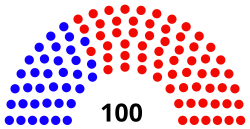West Virginia House of Delegates
| West Virginia House of Delegates | |
|---|---|
| West Virginia Legislature | |
 |
|
| Type | |
| Type | |
|
Term limits
|
None |
| History | |
|
New session started
|
January 11, 2017 |
| Leadership | |
|
Speaker pro tempore
|
|
|
Majority Leader
|
|
|
Minority Leader
|
|
| Structure | |
| Seats | 100 |
 |
|
|
Political groups
|
Governing party
Opposition party
Others
|
|
Length of term
|
2 years |
| Authority | Article VI, West Virginia Constitution |
| Salary | $20,000/year + per diem |
| Elections | |
|
Last election
|
November 8, 2016 (100 seats) |
|
Next election
|
November 6, 2018 (100 seats) |
| Redistricting | Legislative Control |
| Meeting place | |
 |
|
| House of Delegates Chamber West Virginia State Capitol Charleston, West Virginia |
|
| Website | |
| West Virginia State Legislature | |
Governing party
Opposition party
Others
The West Virginia House of Delegates is the lower house of the West Virginia Legislature. Only three states—Maryland, Virginia, and West Virginia—refer to their lower house as the House of Delegates.
Regular sessions begin with an organizational day on the second Wednesday of January of each year. The length of regular session is limited to 60 calendar days. The governor can call for special sessions.
Delegates are elected for terms of two years.
Delegates submit bill proposals to the Office of Legislative Services or legislative staff counsel, who draft the bill. Once the bill draft is approved by the delegate, it is submitted for introduction. Bills then undergo committee review and three readings in the house of origin and then the other house of the state legislature.
An unusual feature of the West Virginia legislative process is that revenue bills can originate in either house. The state constitution also prohibits multiple subjects in a single bill.
If approved by both the West Virginia House of Delegates and the West Virginia Senate, bills are submitted to the governor, who may sign them into law or veto them. State legislators can override the governor's veto of bills with a simple majority vote of both houses, unless the bill is a revenue bill, in which case two-thirds of the members elected to each house are required to override the governor's veto or line-item veto.
Prior to the 1970 Census, districts always respected county lines, with districts always consisting of either a single entire county, or several entire counties. Beginning with that year, the state began to use smaller geographic areas.
...
Wikipedia

